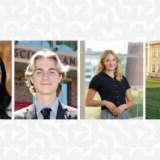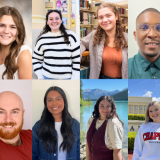A visit to UNED, Universidad Nacional de Educacion a Distancia, in Madrid, Spain
August 11, 2014
Dr. Anaida Colon -Muniz and Dr. Suzanne SooHoo of the College of Educational Studies Faculty visited the National University for Distance Education in Madrid, Spain, Universidad Nacional de Educacion a Distancia (no affiliation with National Univ. in the U.S. ) on a wonderful field trip arranged by Lidia Losada.
Lidia is a faculty member at that university who had a courtesy international appointment at Chapman last fall and wanted to welcome us to her campus, introduce us to her deans and colleagues and give Chapman faculty and students on our travel course a tour to several of their facilities.

From Left to Right: Lidia Losada; Dr. Daniel Anaya Nieto, Director of the Methods and Research Department; Dr. Anaida Colon-Muniz, Chapman University; Dr. Maria Jose, Vice Dean (Vicedecana) Mudarra; Dr. Suzanna SooHoo, Chapman University
In this picture we are in the Vice Dean’s office, Dr. Maria Jose Mudarra, with the Director of the Department of Research Methods and Assessment, Dr. Daniel Anaya Nieto, as well as with our colleague in Madrid, Lidia Losada. We had an amazing tour and introduction to the campus, which has over 22,000 students in Madrid alone, and over 250,000 worldwide through a comprehensive structure that uses a blend of distance learning and live instruction. We hope to continue nurturing the outstanding relationship that we have established with this impressive institution of higher education.
About the Madrid Summer Program
The travel courses to Madrid, Spain, are an opportunity during the summer to spend between three and four weeks in the exciting and dynamic country of Spain while completing one of several courses on second language acquisition that are required for the elementary or secondary teaching credential. Graduate students also take the cross-listed courses at the master and doctoral levels. Classes are held in the bustling center of Madrid during the morning, followed by opportunities to become immersed in the many cultural venues that familiarize students with the day to day experiences of Spanish life, including museums, and cultural and historic sites in its many diverse communities.
The Madrid summer program offers visits to different educational sites. This summer of 2014 we visited the Universidad National de Education en la Distancia (UNED), one of the largest public universities of Spain which offers undergraduate through doctoral university programs to over 200,000 students all over the world. We also visited the
University of Salamanca, one of the oldest universities in Europe, as well as Delibes Language School, which specializes in the teaching of a number of languages to students from all over the world. As a follow up to previous visits, we explored a public/charter Spanish and English bilingual school which serves children from 2 years of age through high school. It uses an innovative approach to language and teaching that ranges from serving public to private students with a range of needs and abilities in the academic areas as well as the arts. With the help of UNED, we were also able to visit to very special programs for people with disabilities. One was PsicoBallet, which uses dance as a means to develop the special and unique abilities of students with disabilities from youth to adults. Some of the participants are now doing professional presentations around the world. The other program we visited was a residence facility and program known as Aprocor, which provides supports, facilities, and events based on the hopes and desires of its participants to improve their quality of life, rather than the traditional service or medical approach. Aprocor’s model is designed to integrate persons with disabilities into the community, making them as independent as possible and as they wish. Over 50 individuals live on the premises and over 200 are served throughout the City. The residents decide on the sort of goals they want to set for themselves together with their families and Aprocor helps to create the support structures needed. The program was founded by a group of parents who wanted their children to grow up into fulfilled adults.
The students and faculty of the Madrid Travel Course have established long term relationships with our Spanish counterparts, and we expect that this serves not only as an example of international good will, but as one path to our Chapman mission of developing a personalized education of distinction and future global citizens.
- Information Technology Building UNED
- CES students outside the School of Education, UNED
- CES students with Dr. Juan-Carlos Pérez-González, bed, MSc, MA, PhD (Honors) ; Professor and Teaching Secretary of the Department of Research and Assessment in Education, Faculty of Education at the Universidad Nacional de Educación a Distancia (UNED). Director of EDUEMO, Emotional Education Laboratory of UNED
- CES Students Kenia and Ashley on the steps of UNED’s historical timeline mural.
- CES students outside the Museo Del Greco; Toledo, Spain.
- CES students with Dr. SooHoo at UNED
- CES students with Dr. SooHoo at UNED








